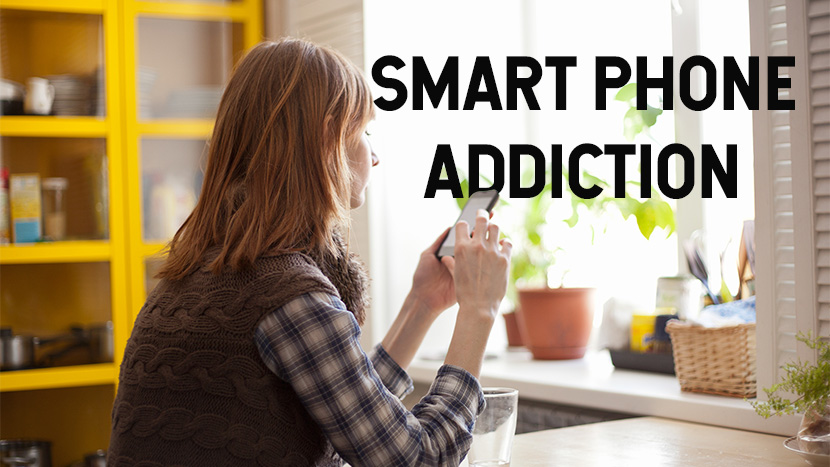The Science Behind Phone Addiction
The use of smartphones is for many of us an integral part of life. These handheld little devices are no longer just a way to handle phone calls remotely. Our smartphones have basically become an extension of ourselves, a part of us. We’ve gotten used to the idea of always having a world of knowledge at our fingertips. Think about it: Whenever a factual disagreement happens in daily conversation, how long does it take for one of the people involved to pick up their phone to Google the answer?
And that’s not all of course. Smartphones have made it into every part of our lives. We handle many close relationships primarily through social media, we use our phones for entertainment through games and films. We even use them to keep track of our health, plan our weeks and to wake us up in the morning. So it’s no wonder that smartphone usage is higher than it has ever been before. And although not yet officially recognized as a psychological disorder, it’s clear that many of us spend an unhealthy amount of time in front of our screens.
In this article we’re going to discuss this phenomenon. What is it that makes us addicted to our phones? And what can we do to get better?
How we become increasingly addicted to our phones
When speaking about phone addiction, most people jump straight into the apps. After all, it’s not the actual device we’re addicted to, but the programs that come with it. But to fully understand how phone addiction works, let’s start with the actual device.
Did you know that smartphones are actually designed to keep you engaged? A few examples of how this works are:
- Phones use sound and vibration to get your attention when something new happens (and new things happen often for many of us!). Most of us get used to notifications, and often pick up our phone automatically when this happens. Sometimes not even being aware of this process!
- Many phones come preprogrammed with various features, such as news feeds, automatic weather updates, alarm clocks and more. While these features are often very useful, we often quickly build a routine of checking these features. This can then work as a catalyst for getting stuck on Instagram or TikTok while we have our phone in our hand.
It is the apps that are the real villains
However, it’s not really the smartphone device itself that we get addicted to. It’s the apps. We’re speaking primarily of social media apps such as Instagram, TikTok and Facebook, as well as games and entertainment apps.
It’s important to remember that social media platforms are businesses, designed to make money. In the digital era, clicks and time spent online is what generates revenue for the social media companies. The more you engage with the app, the more money the company behind it makes. There are countless examples on how companies build social media platforms with the intention of making them addictive to the user. Perhaps the most famous example is when Google Design Ethicist Tristan Harris admitted that features such as the Pull-to-Refresh is directly inspired by online slot machines.
But it’s not only social media apps we spend too much time on. There are many examples of mobile casino games that are designed to keep you playing. Popular mobile games like Candy Crush, Clash Royale and Angry Birds have millions of users. The games are built for fast game play and players are continuously reaching new levels, unlocking new features and completing quests. All these features are well known to keep players hooked on the game, and to keep coming back for more.
Another very popular pastime is online gambling. Many of today’s most popular casino sites have now developed their own mobile applications, which can be downloaded and installed on a smartphone. It’s already well known that these games can be addictive to some people. And once installed on the phone, it’s easy for gambling companies to keep customers coming back again and again. This is thanks to special offers and deals that are sent via notifications to the players.
Another good example is online casino portals. Bonus guides like Hityah often promote online casino offers that are focused on mobile users. So, in order to collect the free spins or the bonus promotion, players must log in via the mobile app of a casino. This way, the casino portal drives traffic to the various casino apps available on the market, converting players who might otherwise just play on their laptops.
How do we become better at managing our screen time?
Mobile phones are now such an integrated part of society, that for most of us it’s just not an option to simply stop using them. But there are several approaches that we can take to limit our screen time, and to build healthier habits.
Dr. Anna Lembke, a professor of behavioural sciences at Stanford University, suggests taking “screen fasts” . This means to take a timeout period from ALL screens (not just your phone). How long one should take this timeout is of course dependent on the level of screen use of the individual. But a good place to start is to take a whole weekend without any screens whatsoever. This way, it doesn’t have to interfere with work or other commitments during the week.
Another effective approach is to simply turn off your phone’s notification system. This way, your phone has less control over you. Rather than having your phone telling you when it’s time to check the screen, you decide for yourself. It’s usually a good idea to have set time during the day when you check your phone.
Lastly, anyone who finds themselves losing control over how much they’re using their phones, should do a proper clean-up of apps. Limit the apps you’re using to the bare minimum. For example, all social media platforms can be accessed through your computer. So do you really need them on your mobile phone? The same goes for games and entertainment apps. By deleting all apps that aren’t absolutely necessary to your everyday life, it will get easier to stay off your phone.


































































































